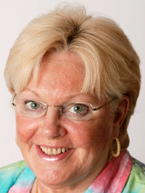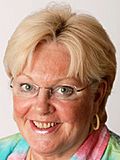The Glasgow Govan by-election was a special election held in Glasgow Govan, Scotland, on 8 November 1973. A by-election happens when a seat in Parliament becomes empty between general elections. This election was needed because John Rankin, the Member of Parliament (MP) for Glasgow Govan, had sadly passed away.
Mr. Rankin was a member of the Labour Party. He had been the MP for Govan since 1955. The Govan area had almost always voted for the Labour Party since 1918. This made it a very strong Labour area.
Why This Election Mattered
The Reason for the By-Election
John Rankin, the MP for Glasgow Govan, died on 8 October 1973. His death meant that his seat in the British House of Commons became empty. This is why a by-election was called. It allowed the people of Govan to choose a new MP to represent them.
The Main Political Parties
- The Labour Party had held the Govan seat for a very long time. They chose Harry Selby as their candidate. He was a well-known local activist. Some people in the Labour Party worried he might be too old to start a new career in Parliament.
- The Conservative Party (UK)|Conservative Party was the main opposition party in the area. They chose John Mair to run. At the time, the Conservatives were in charge of the government. They did not expect to win this election. Their support had also dropped because they did not give a loan to a big local employer, Upper Clyde Shipbuilders.
- The Scottish National Party (SNP) had not won many votes in Govan before. In the 1970 general election, they only got about 10% of the votes. However, many people in Scotland were feeling more nationalistic. This was partly because oil had been found in the North Sea. The SNP had done very well in other recent by-elections. They chose a young teacher named Margo MacDonald as their candidate.
- The Liberal Party (UK)|Liberal Party had once held this area a long time ago. But by 1973, they did not have much support in Glasgow. They had not even put forward a candidate in 1970. For this election, they chose Peter McMillan.
- The Communist Party of Great Britain had come in fourth place in 1970, but with very few votes. They decided not to take part in the 1973 by-election.
The Big Win: Election Results

Margo MacDonald, who won the Govan by-election for the SNP.
Margo MacDonald of the SNP won the election! This was a big surprise for many. It was only the fourth time the SNP had won a seat in the British Parliament. She joined Donald Stewart, another SNP MP, in the House of Commons.
What the Results Meant
- The Glasgow Herald newspaper called Labour's loss a "disaster." It showed that even very safe Labour seats could be won by the Nationalists.
- The newspaper also said that this defeat, along with Labour's struggles in another by-election that day, were "the worst ever" for the Labour Party in Scotland.
- The Labour Party's votes dropped a lot. This was a worrying sign for them, as a general election was expected soon.
- The Conservative Party's votes were cut in half. They even lost their deposit, meaning they did not get enough votes to get their election money back. They barely got more votes than the Liberals.
- After the election, some people criticised Labour members of the Glasgow Corporation. They felt these members had not done enough to help Harry Selby's campaign. The leader of the Labour group, the Rev. Geoffrey Shaw, admitted that some people had been too confident about winning.
After the By-Election
Margo MacDonald did not hold the Govan seat for long. She lost it back to Harry Selby in the February 1974 general election. However, the SNP went on to win seven other seats in that 1974 election. This helped them become a strong and lasting group in the British Parliament.
| Glasgow Govan by-election, 1973 |
| Party |
Candidate |
Votes |
% |
±% |
|
SNP |
Margo MacDonald |
6,360 |
41.5 |
+31.2 |
|
Labour |
Harry Selby |
5,789 |
38.2 |
-21.9 |
|
Conservative |
John Mair |
1,780 |
11.7 |
-16.5 |
|
Liberal |
Peter McMillan |
1,239 |
8.2 |
New |
| Majority |
571 |
3.3 |
N/A |
| Turnout |
15,168 |
|
|
|
SNP gain from Labour |
Swing |
+26.7 |
|







